Are Stealth Oral Cholera Vaccines in Haiti’s Recently ‘Expanded Program of Immunization’? | Les vaccins anticholériques oraux furtifs: sont-ils dans le ‘programme élargi de vaccination’?
Vaccination a priority for the Ministry of Public Health and Population (MSPP)
English | French
Editorial comment
People familiar with the actions in India, Peru, and Bangladesh by the oral cholera vaccine merchants say “they will never quit.” It is up to us to remain vigilant as they recast themselves in various lights.
The promotion of oral cholera vaccines by NGO-patron-saint Paul Farmer has quieted down since the clear demonstration that his ideas are at odds with those of cholera experts such as Prof. Richard A. Finkelstein and also since the discovery that a group of AIDS researchers called Gheskio would be involved in the vaccinations. Given that cholera is caused by bacteria in drinking water, whereas AIDS is caused by a virus during sex, the proposed involvement of Gheskio in a cholera vaccination program is worrying.
The same major players persist, however: namely the Pan American Health Organization (PAHO) and World Health Organization (WHO), both belonging to the UN. PAHO has behaved dishonorably with regard to Haiti’s cholera epidemic, and WHO is reputed to have behaved unethically in medical trials in other countries.
Recall that PAHO’s first response on learning of the Haiti cholera epidemic was to request large sums of money from the public. Consider also that, as the branch of the UN directly responsible for health, PAHO should have been aware of the occurrence of cholera on the Nepalese UN base in Mirebalais. The illness was not exactly subtle, since the equivalent of a bathtub of choleric wastes is estimated to have been produced on the base and then dumped into the Artibonite River.
More recently, cholera expert Prof. Richard A. Finkelstein made it known that he wrote in Dec 2010 to health officials in Haiti including Jon Andrus, the Deputy Director of PAHO, that the proposed use of the vaccine Dukoral was “a useless and expensive waste of resources.” This vaccine was not adopted, but a campaign immediately started for the use of Shanchol, another questionable oral cholera vaccine. Shanchol contains 6-30 times the allowable levels of the mercury-based preservative thiomersal. Lately, the vaccine merchants have been challenging the link between thiomersal and autism in children; whether or not such a link can be definitely proven, drinking 6-30 times the allowable levels of a chemical with mercury is dangerous to health.
In any case, however inoffensive the current “Expanded Program of Immunization (EPI)” might appear, the involvements of PAHO and WHO should sound alarm bells.
Haitian parents would do well to refuse to drink liquids and to forbid their children to drink liquids as part any vaccination campaign, whatever its name.
Dady Chery, Editor
Haiti Chery
By Aline Sainsoivil
Le Matin
Translated from the French by Dady Chery for Haiti Chery
Vaccination of children remains a major concern for the Ministry of Public Health and Population (MSPP). This Monday, March 12, a meeting was held at the Hotel Montana to present the status and objectives of the national immunization program.
In the presence of representatives from several partner health institutions partners, including UNICEF, PAHO-WHO, the Ministry of Public Health and Population (MSPP) presented a plan to strengthen the Expanded Program of Immunization (EPI). Work has been undertaken since 2011 to strengthen the program, reported Dr. Ronald Jean Cadet, EPI manager.
A comprehensive multi-year plan (CHP) for the period 2011-2015, a plan to strengthen the cold chain and put in place institutional and strategic policies were among other measures taken last year. The MSPP has also documented and verified the elimination of measles, rubella and CRS. He announced the introduction of three new vaccines in 2012, namely penta, pneumo and rota.
The MSPP drew particular attention to the importance of routine immunization that must ensure maximum coverage in the entire territory. Indeed, it aims to reach 90% within one year with all EPI vaccines by 2015, with the exception of BCG. In this regard, strengthening the program and financial sustainability are priorities for the ministry.
To achieve its objectives, the MSPP has developed strategies, including epidemiological surveillance, an integrated communication plan, an effective cold chain in at least 80% of institutions affiliated to the EPI. The cold chain includes storage means, transport, staff training, and information. Verification of injection and waste management will be included in the program.
For his part, Dr. Jeannot Francois, spoke on intensive activities for child health. He noted that a significant number of children, or 273,860, have missed the vaccination program since 2008. This figure represents more than a birth cohort evaluated at 252,664 children.
“The epidemic is upon us, we must make a decision,” he claimed.
[What epidemic might this be, if Dr. Francois is not talking about a cholera vaccination? DC]
In addition, he brought up the risk of reintroduction of wild strains of measles and polyo due to the precarious sanitation and lack of vitamin A. He plans to vaccinate 2,519,685 children between 0 and 9 years old and women 15 to 49 who accompany their children. The strategies are, among others, the door to door, muster stations, visiting schools and markets.
The Minister of Public Health, Mrs. Florence Duperval William, in a press briefing at the end of the ceremony, expressed her determination.
“We want to vaccinate 100% of children under one year,” she said.
A case of polio can give us a handicapped that we will support for all his life. We cannot watch a child die of tetanus or diphtheria when we could avoid it, without feeling guilty, she argued.
Ms. Duperval calls for the support of the private sector. While guaranteeing her leadership, she reiterated her commitment to the fight for the children to become “worthy adults and leaders of tomorrow.”
sainsoivil_aline@yahoo.fr
Source: Le Matin (French) | Haiti Chery (English)
Vaccination : une priorité pour le Ministère de la Santé Publique et de la Population (MSPP)
anglais | français
Commentaire
Ceux qui savent les actions en Inde, au Pérou et au Bangladesh des vendeurs de vaccins anticholériques oraux disent qu ‘«ils ne cesseront jamais d’essayer de les vendre.” Il est à nous de rester vigilants car ils reviendront differamment masqués.
La promotion des vaccins anticholériques oraux par le patron des ONG Paul Farmer s’est calmée depuis la démonstration que les idées de M. Farmer contredisent celles des experts du choléra tels que le professeur Richard A. Finkelstein, et aussi depuis la decouverte qu’un groupe de chercheurs sur le SIDA appelé Gheskio participerait aux vaccinations. Étant donné que le choléra est causé par des bactéries dans l’eau à boire, alors que le SIDA est causé par un virus lors de rapports sexuels, la participation proposée de Gheskio dans un programme de vaccination contre le choléra est curieuse.
Les mêmes acteurs persistent, tels que l’Organisation Panaméricaine de la Santé (OPS) et l’Organisation Mondiale de la Santé (OMS) qui appartiennet tous les deux à l’ONU. l’OPS s’est comportée evec un grand déshonneur à l’égard de épidémie de choléra en Haïti et l’OMS est connue pour des essais medicaux inéthiques dans d’autres pays.
Rappelons nous que la première réponse de l’OPS sur l’épidémie de choléra en Haïti a été de demander de grosses sommes d’argent du public. Considérons également que, comme la branche de l’ONU directement responsable pour la santé, l’OPS aurait dû être au courant de l’apparition du choléra sur la base népalaise de l’ONU à Mirebalais. Ce n’était pas subtile. L’équivalent d’une baignore de déchets colérique a été produite sur la base, et puis déversée dans l’Artibonite.
Plus récemment, un grand expert sur le choléra, le professeur Richard A. Finkelstein a fait savoir qu’il avait écrit en décembre 2010 aux fonctionnaires de la santé en Haiti, y compris Jon Andrus, directeur adjoint de l’OPS pour leurs faire savoir que l’utilisation proposée du vaccin Dukoral était “un gaspillage assez coûteux des ressources.” Ce vaccin n’a pas été adopté, mais une campagne a immédiatement commencé pour l’usage du Shanchol. Le Shanchol est un autre vaccin anticholérique oral qui est assez douteux. Le Shanchol contient 6 à 30 fois les niveaux admissibles du préservatif thiomersal qui est à base de mercure. Actuellement les vendeurs de vaccins disent qu’il est difficile de lier le thiomersal à l’autisme chez les enfants; que la réponse soit oui ou non, boire 6 à 30 fois les niveaux admissibles d’un produit chimique à base de mercure est absolument dangereux pour la santé.
Malgré le nom inoffensif “Programme Elargi de Vaccination (PEV)”, l’association du programme à l’OPS et l’OMS devrait sonner l’alarme.
Les parents haïtiens feraient bien de refuser de boire des liquides et d’interdire à leurs enfants de faire de même dans le cadre de toutes campagnes de vaccination, quels que soient leurs noms.
Dady Chery, Rédaction
Haiti Chery
Par Aline Sainsoivil
Le Matin
La vaccination de l’enfant demeure une préoccupation majeure pour le Ministère de la Santé Publique et de la Population (MSPP). Ce lundi 12 mars, une rencontre a eu lieu à l’hôtel Montana pour présenter l’état d’avancement et les objectifs du programme national de vaccination.
En présence de représentants de plusieurs institutions sanitaires partenaires, notamment l’UNICEF, l’OPS-OMS, le Ministère de la Santé Publique et de la Population (MSPP) a présenté un plan de renforcement du programme élargi de vaccination (PEV). Des travaux ont été entrepris depuis 2011 pour le renforcement du programme, a rapporté Docteur Jean Ronald Cadet, directeur du PEV.
Un plan pluri-annuel complet (PPAC) pour la période 2011-2015, un plan de renforcement de la chaine de froid, des mises en place institutionnelles et stratégiques sont entre autres mesures prises l’année dernière. Le MSPP a effectué aussi la documentation et la vérification de l’élimination de la rougeole, la rubéole et du SRC. Il a annoncé l’introduction de trois nouveaux vaccins en 2012, à savoir le penta, le pneumo et le rota.
Le MSPP a particulièrement attiré l’attention sur l’importance de la vaccination de routine qui doit assurer une couverture maximale au niveau de tout le territoire. En effet, il vise à atteindre 90% des moins d’un an avec tous les vaccins du PEV d’ici 2015, à l’exception du BCG. En ce sens, le renforcement du programme et sa viabilité financière constituent des priorités pour le ministère.
Pour atteindre ses objectifs, le MSPP a élaboré des stratégies, notamment, la surveillance épidémiologique, un plan intégré de communication, une chaine de froid efficace dans au moins 80% des institutions affiliées au PEV. La chaine de froid inclut les moyens de stockage, entreposage, transports, formation du personnel, information. La vérification des injections et la gestion des déchets seront pris en compte dans le programme.
De son côté, le docteur Jeannot François, est intervenu sur les activités intensives pour la santé de l’enfant. Il a fait remarquer qu’un nombre important d’enfants, soit 273 860, a échappé au programme de vaccination depuis 2008. Ce chiffre représente plus qu’une cohorte de naissance évaluée à 252 664 enfants.
« L’épidémie est à nos portes, il faut prendre une décision », a-t-il clamé.
[De quelle épidemié parle le Dr. Francois s’il ne parle pas de la vaccination contre le choléra? DC]
En outre, il a évoqué le risque de réintroduction des virus sauvages de polyo et de rougeole augmenté par la précarité de l’assainissement et la carence en vitamine A. Il a prévu de vacciner 2 519 685 enfants de 0 à 9 ans, ainsi que les femmes de 15 à 49 ans qui accompagneront leurs enfants. Les stratégies prévues sont, entre autres, le porte-à-porte, les postes de rassemblement, la visite dans les écoles et les marchés.
La ministre de la santé publique, Madame Florence Duperval Guillaume, dans un point de presse donné à la fin de la cérémonie, a exprimé sa détermination.
« Nous voulons vacciner les 100% d’enfants de moins d’un an »,
a-t-elle déclaré. Un cas de poliomyélite peut nous donner un handicapé que nous devrons prendre en charge toute sa vie. Nous ne pouvons regarder un enfant mourir de tétanos ou de diphtérie alors que nous pouvions l’éviter, et ne pas nous sentir coupable, a-t-elle soutenu.
Madame Duperval en appelle au support du secteur privé. Tout en garantissant son leadership, elle a réitéré son engagement dans la lutte pour que les enfants deviennent « des adultes dignes et responsables de demain ».
sainsoivil_aline@yahoo.fr
Origine: Le Matin

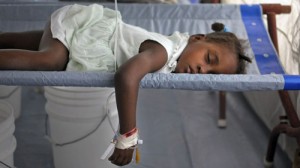
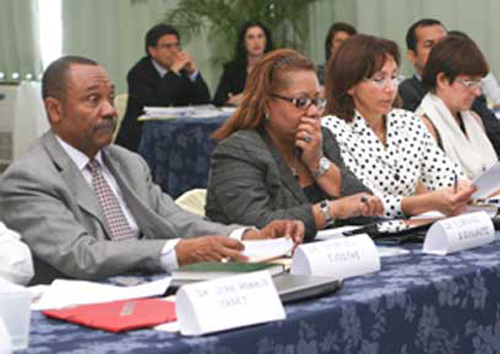
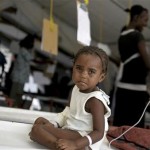

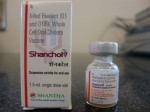
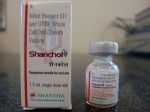
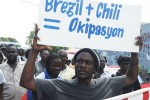
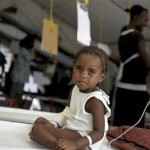
Comments
Are Stealth Oral Cholera Vaccines in Haiti’s Recently ‘Expanded Program of Immunization’? | Les vaccins anticholériques oraux furtifs: sont-ils dans le ‘programme élargi de vaccination’? — No Comments